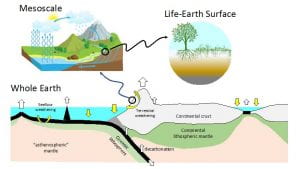The Earth is habitable through feedbacks between biological and geological processes. In this REU we will study questions like:
- What controls the temperature of the Earth?
- What controls nutrient concentrations in forests?
- How does the composition of the deep Earth influence the composition of the atmosphere?
- Why does the Earth have water on the surface?
- How does plate tectonics influence long-term climate?
Research experience in planetary habitability
Students will be introduced to complex, interconnected planet-scale systems by participating in research on how the Earth becomes habitable. Novel research projects will explore the relationships between dynamic planetary processes and life by answering questions of how the Earth influences life and how life, in turn, modulates Earth’s own evolution. Projects range from field and laboratory experiments that help us understand the composition of Earth’s deep interior, creating and modifying its surface, to modeling the evolving composition of its atmosphere.
EEPS scientists work together to understand the Earth as a whole system, providing a variety of research opportunities for undergrads to participate in these interdisciplinary activities.
Participants can choose among 8 areas of interdisciplinary research among three themes associated with planetary habitability: Whole Earth Systems, Mesoscale Systems, Life-Earth Systems
